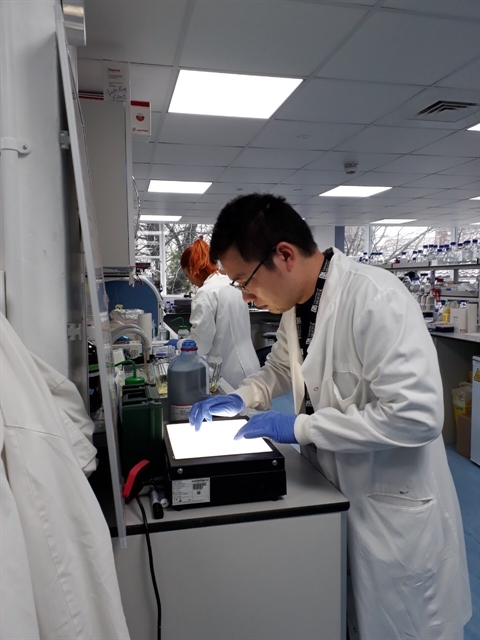 Society
Society


|
| Researcher Mạc Văn Trọng works at a lab of UK's Bristol University. — Photo suckheodoisong.vn |
HÀ NỘI — A vaccine for COVID-19 that is being developed by State-owned vaccine manufacturer VABIOTECH Co., Ltd. could generate relatively high immune response, according to the company chairman Đỗ Tuấn Đạt.
On May 15 and May 29, two batches of samples of 50 mice injected with the COVID-19 candidate vaccine were sent to the National Institute of Hygiene and Epidemiology (NIHE).
Comparing the mice serum injected with the inactivated wild-type virus, the NIHE determined that these serum samples gave antibody responses, some of which were relatively high.
“This is a foundation to develop a completed vaccine,” said Nguyễn Lê Khánh Hằng, vice head of the Virus Department under the NIHE.
Mạc Văn Trọng, a researcher from VABIOTECH, said the results which were released in mid-June proved they were on right track to develop the COVID-19 vaccine and that four months of restless work was starting to bear fruit.
VABIOTECH has finished the first phase of the vaccine development two months early, Trọng said, adding that this phase was the most important in the development of the COVID-19 vaccine.
In the next phase, the candidate vaccine would be completed and stabilised to meet requirements for human use.
The research team would also develop procedures for commercial production of up to dozens of millions of doses, Sức khoẻ & Đời sống (Health and Life) newspaper reported on Friday.
“It takes about nine to 12 months to complete the candidate vaccine,” Trọng said, adding that his team was trying their best to shorten the time needed.
“On average, it takes 10 years to develop and produce a vaccine. So, it is a great achievement to find a vaccine in a period of 18-24 months,” Trọng said.
The COVID-19 vaccine development project not only gives birth to a new vaccine but more importantly, it would help Việt Nam be more active in vaccine production in response to pandemics.
In the future, in case a new strain of coronavirus causes another disease for humans, with the available technology, researchers just replace the gene of the current one with the gene of the new strain, so it would soon produce a new vaccine.
Đạt said while Việt Nam itself has a vaccine manufacturing industry, this is the first time a vector-based vaccine is being developed, so plenty of caution is needed.
For this method, researchers use the SARS-CoV-2 antigen to insert into another pathogenic virus that has been weakened to be introduced into the immunised subjects, which hopefully would trigger the body to generate antibodies that are capable of defending against the onslaught of the actual full-fledged virus.
The antigen, the core part of a vaccine, works well and can elicit a good immune response from the test subjects.
If the antigen generates good immune responses, candidate vaccines will be developed and tested on a wider range of animals – especially in larger mammals like monkeys – to test the immune responses before going onto clinical trials on humans. — VNS




